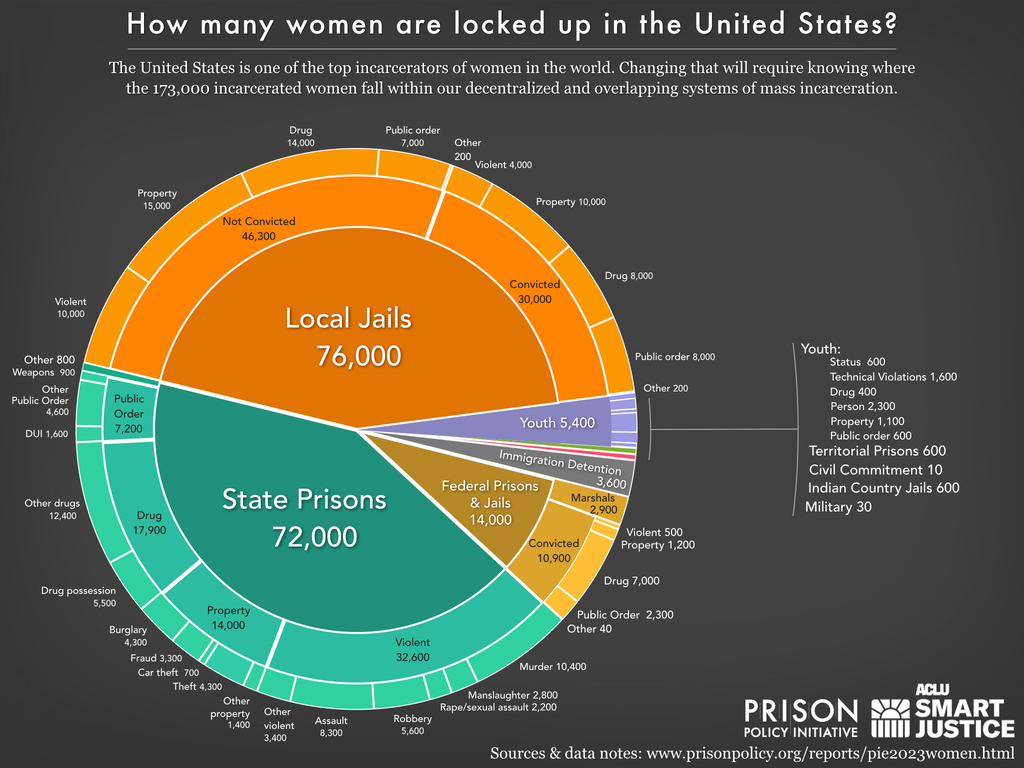New report, Women’s Mass Incarceration: The Whole Pie 2023, reveals how many women are locked up in the U.S., where, and why
The report examines the unique challenges women in the criminal legal system face and provides the clearest look at how the pandemic impacted women's incarceration in the U.S.
March 1, 2023
A report released today by the Prison Policy Initiative and the ACLU Campaign for Smart Justice presents the most recent and comprehensive data on how many women are locked up in the U.S., in what kinds of facilities, and why; as well as detailed data on incarcerated women’s demographic makeup and health.
Women in the U.S. experience a dramatically different criminal legal system than men do, but data on their experiences is difficult to find and put into context. The new edition of Women’s Mass Incarceration: The Whole Pie, which the Prison Policy Initiative and ACLU have published since 2017, fills this gap with richly-annotated data visualizations about women behind bars.

The report reveals that the number of women behind bars fell significantly as a result of the COVID-19 pandemic, but is already rapidly returning to pre-pandemic levels. “The drop in women’s incarceration that we saw in 2020 was the kind of change needed to actually start ending the mass incarceration of women,” said report co-author Aleks Kajstura. “Unfortunately, because the changes during the first year of COVID-19 were due more to systemic slowdowns than policy changes, we’re already seeing the downward trend being reversed and more vulnerable women ending up in prison.”
The report highlights the importance of jails — an under-discussed part of the criminal legal system — to the story of women’s incarceration. Approximately the same number of women are locked up in jails as in state prisons. Jails are built for short stays, meaning that the disproportionate number of women locked up in jails (compared to incarcerated men) are stuck in facilities with worse healthcare and less programming.
Women’s Mass Incarceration: The Whole Pie 2023 also includes a section offering insights about the backgrounds and experiences of women in state prisons. Key takeaways include:
- Significant numbers of women in prison end up there after being disadvantaged as children: 12% report homelessness before they turned 18; 19% were in foster care at some point; and 43% came from families that received welfare or other public assistance.
- 53% of women were jobless in the month before the arrest that led to their incarceration, suggesting that unemployment is a major factor in leading women to interactions with the criminal legal system.
- Most women in prison have physical/cognitive disabilities (50%) and/or mental illnesses (76%), showing the punitive approach state and local criminal legal systems have taken to people struggling with these serious health issues.
- 58% of women in state prisons are parents to minor children, and of those, most are single mothers who were living with their children prior to imprisonment — making it likely that incarceration uprooted their children and led to the termination of their parental rights, permanently breaking up their families.
Finally, the report breaks down the racial demographics of women in prison and jail, details the number of women on probation and parole, and provides key statistics on the incarceration of girls in juvenile facilities.
“Too often, low-income women are punished by laws criminalizing poverty and caught in the wide net of Broken Windows policing that harms families and communities,” said Kajstura. “Both criminal justice reform and broader efforts to expand welfare and healthcare in this country will be necessary to end our nation’s tenure as the world’s leading incarcerator of women.”
The new report is available here: https://www.prisonpolicy.org/reports/pie2023women.html



